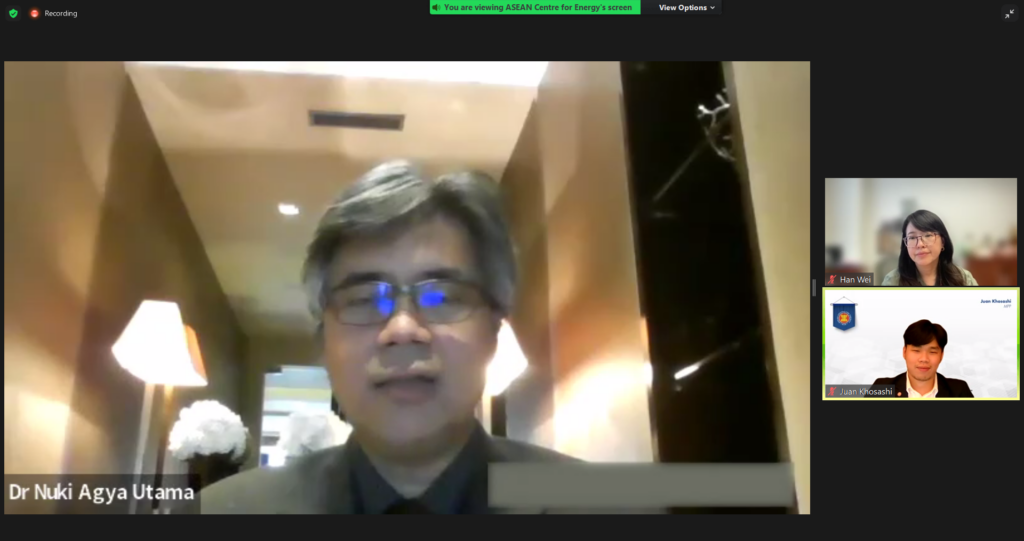Menu
On June 26, 2023, the ASEAN Centre for Energy (ACE) and the Energy Foundation China (EFC) collaborated to host the Report Launching Event for the strategic report titled “Measures and Investment for Clean Energy and Power Sector Resilience in ASEAN”. This event aimed to provide policy recommendations to the ASEAN Member States (AMS) to enhance their capability to attract clean investment for energy infrastructure and to share valuable insights regarding an integrated approach to green fiscal consolidations, focusing on facilitating the energy transition in Southeast Asian countries.
The event commenced with welcoming remarks from Ms Han Wei, Director of Projects at the President’s Office of EFC. She highlighted EFC’s ongoing support to ACE in conducting research on investment in energy transition in ASEAN over the past few years. Ms Wei pointed out the latest project’s goal to provide policy recommendations to create enabling conditions for infrastructure investments. She further emphasised the immense potential for emission reduction and energy transition in the ASEAN region, which is reinforced by the plans and targets set by each country in the region. Ms Wei underscored the significance of sustainable finance as the key to realising these long-term targets.

The subsequent session featured Dr Nuki Agya Utama, the Executive Director of ACE. He highlighted the ASEAN region’s commitment to a wide range of low-carbon investments, including initiatives focused on energy access maximisation, renewable energy (RE) integration, power grid enhancement, and electric transportation deployment. However, Dr Nuki acknowledged that achieving these targets under current conditions is not an easy task and necessitates policy outcomes and opportunities that benefit local low-carbon energy investment infrastructure. He emphasised the importance of fostering an enabling regulatory environment to attract sufficient investment in the energy sector, and thus, the study aimed to assess short-term measures for mobilising longer-term investment in clean energy and the power sector.
Following the previous sessions, Ms Rika Safrina, Senior Analyst of ACE, presented an introduction to the report study. She highlighted that the high risk and low return on investment had led many capital banks in ASEAN to be reluctant to finance clean energy investments. In light of this, she explained the study’s objectives, which aimed to address the significance of attracting energy investment in ASEAN, identify key priority areas for enhancing regional capabilities in energy investments and financing, and provide insightful guidelines for ASEAN regulators and policymakers to make informed decisions regarding investment policies in the energy sector.

Following that, Dr Nora Yusma of the Universiti Tenaga Nasional presented the study’s findings, highlighting challenges faced by ASEAN Member States in clean energy initiatives and the selection of financing tools and business models. She emphasised the impact of poorly administered legislation, which hampers investor attraction even at lower prices. Dr Yusma also shared best practices within ASEAN as references and discussed a capacity-building roadmap for clean energy investment and policy recommendations to improve energy investment in the region.
Subsequently, Ms Cecilia Tam, Senior Investment Analyst at the International Energy Agency, delivered a commentary presentation on scaling up clean energy investments in emerging and developing economies. Ms Tam highlighted the widening gap between global clean energy investments and investments in fossil fuels. While clean energy investment has been increasing globally, it has remained stagnant in emerging and developing economies, with the exception of China. She emphasised the need for a steep pathway to achieve the Sustainable Development Goals and climate goals. Scaling up private finance was identified as a crucial element of the solution to reach these targets.
Continuing the event, Ms Monika Merdekawati, Research Analyst of ACE, delivered a presentation on clean energy investment needs in ASEAN. She provided insights into the current situation of RE share in ASEAN. Additionally, she discussed the risk levels associated with different phases of a clean energy project, emphasising that the development stage is the most volatile phase in terms of risk.
Following the presentations, a discussion took place, moderated by Ms Rika Safrina. The session primarily revolved around exploring potential improvements for the study, how the report can assist ASEAN in progressing towards their regional targets, and how this regional report can contribute to the global one. The panellists discussed leveraging the findings to drive positive change, enhance collaboration, and align regional efforts with global sustainability goals.
Attended by almost 200 participants, the event concluded with closing remarks from Dr Zulfikar Yurnaidi, Manager of ACE. Dr Zulfikar thanked all the speakers and participants for actively participating in the event. He hoped the study would serve as an insightful guide for the participants, ASEAN regulators, and policymakers, enabling them to make informed decisions regarding investment policies to attract funding for energy infrastructure. Dr Zulfikar emphasised the importance of collaboration and collective efforts in advancing clean energy investment in the ASEAN region, ultimately contributing to sustainable and resilient energy systems. The recording can be found on ACE YouTube.
